The Welcome Wagon Share New Song and Video, “I Can Cross the Sea”
“This is a song we wrote for people who have to cross great seas and bear great burdens.”
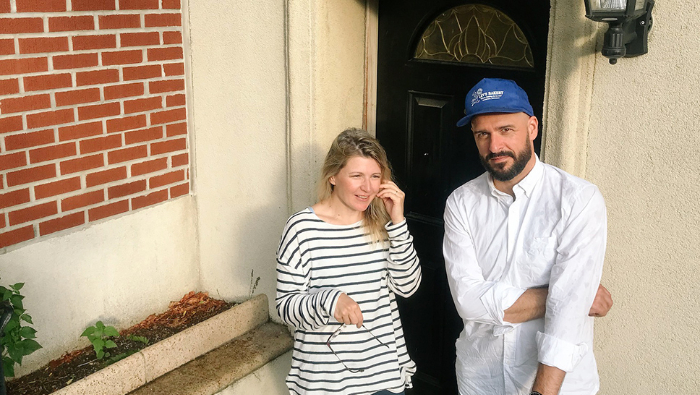
Pictured: The Welcome Wagon
Featured Artist News category interest
The Welcome Wagon have shared a brand new single, “I Can Cross the Sea,” and a new video. The video captures the live recording of the song (take 12, according to Vito), as performed in May this year at the height of lockdown at St. Paul’s Luthern Church in Brooklyn. Vito Aiuto is on vocals and guitar, Monique Aiuto on vocals, Jeremy McDonald (Mason Jar Music) on bass, Evan Gregory (Gregory Brothers) on piano, and Anthony LaMarca (War on Drugs) on lead guitar and drums.
You can listen and share the song here. Athsmatic Kitty Records also be hosting a hang out with The Welcome Wagon on Monday November 1st on our Instagram account here.
Vito has penned a missive with the song:
The moon grows full and fat, then diminishes again. A family finishes dinner, the clink of dishes in the sink, then gathers in the living room in front of the television to watch together. Next door a widow watches the same show on her own set. You buy a horseshoe at the antique market. Later on you’re eating carrot sticks and searching for information on horseshoes (Does it hurt the horse when they nail it on? No, not if it’s done correctly), and your internet goes out and is absent the rest of the day. The emptiness! Long ago you used to be so much younger, you never woke up in the night, gasping for breath, petrified, (well, wait, yes, you did, that night terrors thing in 3rd grade) but now sometimes you’re not sure you could say what life even is. You recall you’ve become unmoored like this before (isn’t it strange, the consolation contained in your previous moments of utter confusion and despair?), there’s precedent here. And after a length of time—sometimes an afternoon, sometimes a summer—you feel on top of it again. Got your bearings. Back at it! Yet the questions keep falling like leaves, sometimes flying right in your face: Does the rain have a father? Am I lovely? What are all these keys for? Why do the nations so furiously rage together? Tell me, Momma! Yet you can be sure of just one thing: Your very own broken heart is not just a mountain, it’s a whole mountain range, winding, wild, steep, indomitable, impassable, unsafe, jagged with…. Look, it’s a mountain range, that’s what I’m telling you: You can’t even understand a dandelion, let alone a mountain range, you know? And that’s where you live, in the mountain range of your broken heart, lost, lonely, drifting, underneath a sky that’s green and sick and drifting, the confusion like fog (or the fog of confusion, I don’t know which), and then…
Then some innocent afternoon arrives and there’s a door you must walk through. Just one, solitary door. Or a broomstick over which to jump: this broomstick, not another. Or you arrive at the shore of an enormous body of water and it must be crossed, there’s not another choice. And that’s the gift. I don’t mean that the journey you’re about to undertake is a gift: no way, friend, the journey is a half a nightmare: there are monsters in there (bad ones), the waves are canyons, your little bark is a goner. No, the gift is that at least you know what is being asked of you. Finally, for a moment, life is reduced to one thing: This choice. This journey. This word to say. Or not to say. This chance to forgive. This promise to keep. Or start keeping again.
This is a song we wrote for people who have to cross great seas and bear great burdens. This is a song for people who are fighting the good fight. We love you and we’re rooting for you like crazy.
The Welcome Wagon is a married couple, the Reverend Thomas Vito Aiuto and his wife Monique, who execute a genre of gospel music that is refreshingly plain. Their hymns are modest and melodic takes on a vast history of sacred song traditions, delivered with the simple desire to know their Maker—and to know each other—more intimately.
Raised on a farm, by a gentleman farmer father and choir teacher mother, in the same small town as Vito, Monique moved to New York City after high school to study art, first at the Cooper Union (BFA), then Columbia University (MFA). Since then she has worked as a pre-school teacher, craftmaker for Martha Stewart, and as a mother. She also serves as the Welcome Wagon’s resident visual artist.
The Welcome Wagon began as husband and wife singing in the privacy of their home. Having little to no previous musical experience or training, Vito purchased a guitar with the desire to sing hymns with his family. With Monique accompanying on toy glockenspiel or harmonica, the two would amble through old hymnals, psalters and prayerbooks. Their inability to read music was no big issue; Vito simply made up new tunes to old words.
While their most familiar venue was (and is) their living room, the Welcome Wagon have been periodically coaxed to small stages at bars, parties, and seminaries throughout the New York City area, often joined by friends on upright bass, drums, piano, and banjo. These intimate arrangements preserve the delicate nature of the Welcome Wagon’s identity.
But there is another Welcome Wagon, the one that can be heard on their debut album, Welcome to the Welcome Wagon. This version of the band retains the heart and soul of pastor and his wife singing together, but dresses them up in the transcendent musical vestments of Sufjan Stevens, who produced and helped arrange the record.
Those who enjoyed the Welcome Wagon’s debut album will notice their distinct sound again in their sophmore release: Precious Remedies Against Satan’s Devices – loose, jangly, comfortable, a gathering of friends making music together. It’s at times jaunty and toe-tapping, at others quietly contemplative, an alt-folk gem that sounds very much like it comes out of the Asthmatic Kitty camp. But while the first album was recorded over the course of eight years in various venues, this one was done in five days at the library of an old rectory in Brooklyn. And while recording artist and AK co-owner Sufjan Stevens produced WW’s first album, he’s less noticeable on this collection, produced by Alexander Foote, who also plays guitars, organ, autoharp, percussion, and some piano. (Stevens does play banjo and piano and sings in the choir on several songs here.)
Admittedly, for a gospel duo, there’s far less soul than sweet sincerity in the casual songs of the Welcome Wagon. Vito and his wife are unabashedly Midwestern, ordinary and uncool. But this is precisely what sets them apart from the standard fare of contemporary liturgical music. It doesn’t feign emotion; it doesn’t pander to stylistic pretensions; it doesn’t pretend to be anything other than what it is: the result of countless, informal social exchanges between friends. A home-cooked meal followed by a few microphones taped to folding chairs. A family gathering, a summary of happy noises, and a room crowded with familiar faces. Sure, there are showy guitar riffs and piano codas and harmonica solos, a rowdy chorus, an imposing flourish of brass instruments like wartime canons. But at the heart of it—if you really listen carefully—there’s just a pastor and his wife singing joyfully in the quiet privacy of their own home
More Photos
More from Featured Artist News

Featured Artist News
The War And Treaty Earns 3rd Consecutive Academy Of Country Music Awards Nomination For ‘Duo Of The Year’
The Plus One Tour To Stop At NYC’s Irving Plaza, LA’s Troubadour, DC’s Howard Theatre, And More
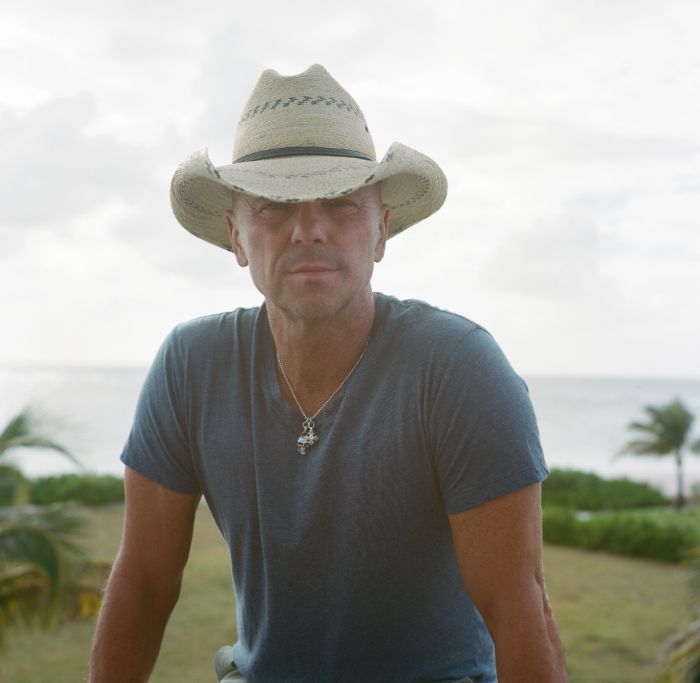
Featured Artist News
Kenny Chesney Named to the Country Music Hall of Fame
Pre-Birthday Gift That Defies The Imagination Brings Him Into A Very Exclusive Circle Alongside
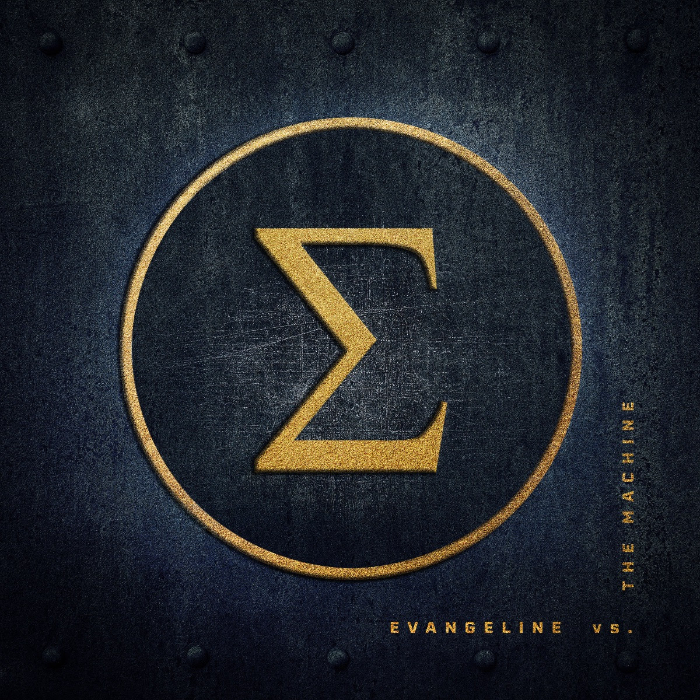
Featured Artist News
Eric Church’s “Hands Of Time” Breaks Personal Record as Most Added at Country Radio Ahead of Evangeline vs. The Machine
Evangeline vs. The Machine Arrives May 2

Featured Artist News
Country Singers Alana Springsteen And Dylan Gossett Get Festival-Ready With TravisMathew
As official brand ambassadors, Springsteen and Gossett will make their Stagecoach debuts this year + share their favorite picks from TravisMathew’s “Festival Edit” lookbook
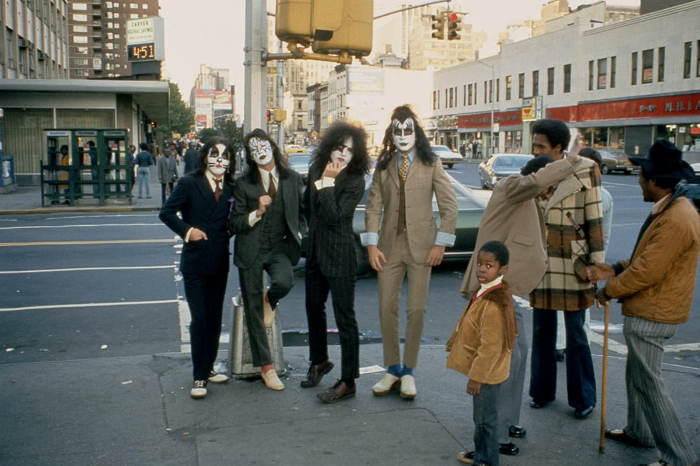
Featured Artist News
KISS Celebrates 50 Years of Dressed to Kill with Exclusive New York City Audio Tour
This never-before-heard experience will offer fans an immersive journey

Featured Artist News
Concord Music Publishing Signs Singer-Songwriter Zachary Knowles
He’s been recognized by publications including Ones to Watch, Uproxx, Earmilk, The Line of Best Fit – and it’s clear he is just getting started



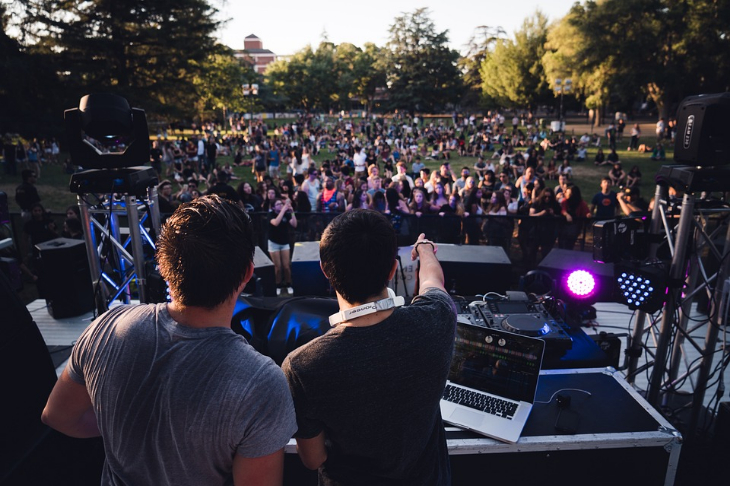

 Newsletter Signup
Newsletter Signup